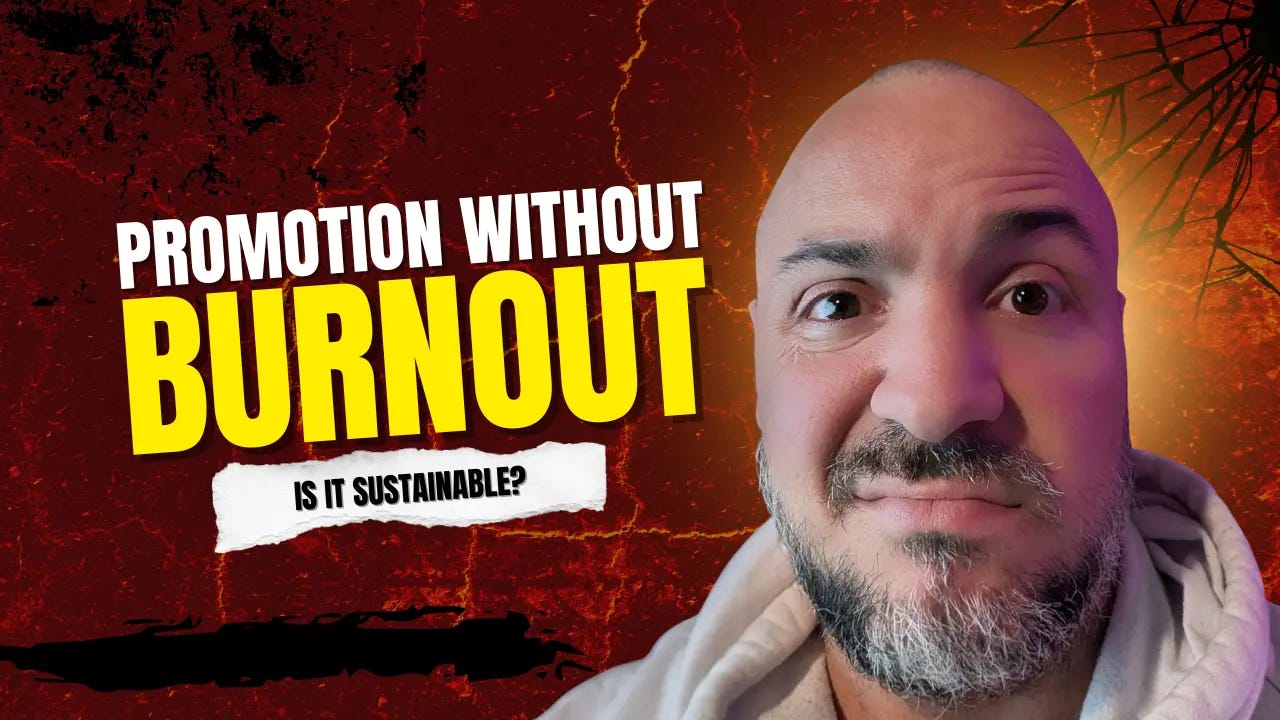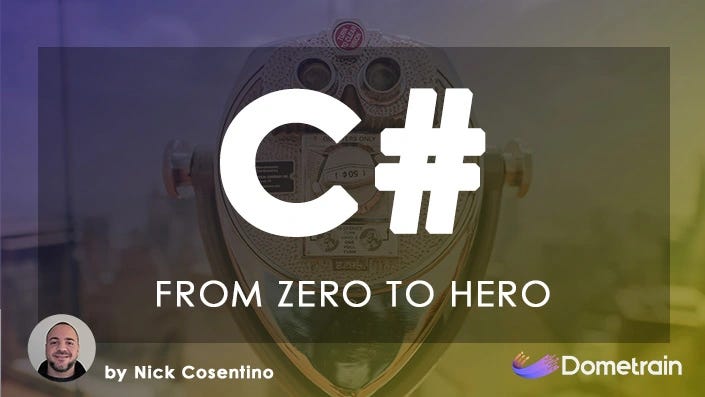Promotions Without Burnout
Dev Leader Weekly 112
TL; DR:
Sustainability is key.
New level means higher expectations.
Check out the livestream (or watch the recording) on Monday, October 13th at 7:00 PM Pacific!
Getting Promoted Without Burning Out
Promotions in software engineering aren’t magic. They’re earned through evidence -- not promises, not potential.
But what about weekend burnout sessions? Will that lead to promotions?
It might -- but it’s not sustainable. That’s exactly what we’re going to discuss in this article, but if you want to listen to my thoughts, you can check out this Code Commute video:
If you’re wondering how to work toward your next level without losing your sanity, let’s break this down practically. I’ve seen developers get it right, I’ve seen them crash and burn, and I’ve been on both sides of the table as an engineer and an engineering manager.
This isn’t about hustle culture -- not if we want to have awesome careers before we burn ourselves out. It’s about building proof that lasts.
Promotions Reward Evidence, Not Hope
A promotion isn’t your manager saying, “I think they could do it.” It’s them saying, “They’re already doing it.”
When managers advocate for a promotion, they are not gambling on potential. We have to present evidence of consistent performance at the next level. Managers need that confidence because promotions almost always go through more than one layer of review. We need to convince other people too.
So if you want that next level, stop thinking about how to convince someone you could handle it. Start operating like you already are handling it. Then make that visible.
Sometimes this mental shift can help with frustration or friction around understanding promotions. If you’re wondering why someone isn’t taking a chance on you to do be at the next level, it’s because that’s simply just not how it works. It’s not about taking chances on people, it’s about you demonstrating that you do operate at that next level.
More Work Isn’t the Answer
You don’t get promoted by working more hours. You get promoted by working on higher-impact things.
If the only way you can perform at the next level is by staying up late or burning weekends, guess what happens after you get promoted? The moment you stop working those extra hours, your performance drops if it was tied to simply just working those extra hours. Now you look like you can’t sustain the level you were just promoted to.
That’s not the outcome you want.
Instead of “more,” focus on different. You need to stretch the scope of your work, not your schedule.
One way to think of this is that it’s not about just doing more things. For example, let’s say you close 10 bugs and ship 4 small features. That’s solid work. But someone at the next level might spend the same amount of time landing one initiative that has a significantly greater business impact than all of those small work items combined.
Both are valuable, but one changes the system. That’s the difference between “doing more” and “doing higher-impact work.”
Another important note is that at more junior levels, sometimes it can be about getting more things done. That’s because you’re in a period of your work where you’re:
Ramping up
Building confidence
Becoming more independent
The way to generalize all of this is focusing more on level-appropriate work -- not just “more”.
Stretch, Don’t Snap
Stretch assignments are how you grow, but too much stretch just breaks you. The key is to maintain a balance between core work and growth work.
Here’s a way to think about this:
Keep nailing your regular responsibilities. These build trust and show you are accountable for delivering on your expectations.
Add a stretch project that broadens your scope or increases your impact.
Not five. One. Land it fully. Show you can handle something new without dropping the fundamentals. If you try to take on too many things, you may drop the ball on most or all of them instead of showing that you can successfully stretch yourself.
When managers see that you can stretch and sustain, that’s when you’ll seem more prepared for promotion.
Talk to Your Manager Early
This is where I think there’s a huge opportunity for developers. Unfortunately, many start “doing extra” without aligning with their manager.
If your manager doesn’t know what you’re working on, or doesn’t agree that it’s the right extra work, that extra effort may not help your promotion case.
Your manager is your sponsor in this process. They’re the one who has to make the argument for you and represent you when it comes to promotions.
Here’s how to align:
Start with intent.
“I’m hoping to move toward the next level. Can we talk about what that looks like here?”Ask for specifics.
“What kind of impact or behaviors do you need to see from me to make that case confidently?”Plan together.
“Here’s what I’m currently delivering. Here are a few stretch ideas. Which of these would best demonstrate readiness?”Confirm the timeline.
Promotions often follow cycles. Ask, “Which review cycle are we targeting?” -- You may not get an exact timeline on this, especially because it’s unwise for a manager to try and make a promise around a timeline. However, it’s a good opportunity to get a shared understanding of a timeline for them aiming to represent you.Set check–ins.
Don’t wait six months to find out you were working on the wrong things. Revisit monthly, bi-weekly, or some cadence that makes sense for you.
If your manager says you’re “on track,” ask for clarity. Does that mean this upcoming cycle or the next one? What still needs to be proven?
And if your manager can’t or won’t have this conversation at all -- that’s a bigger issue. You can’t grow where the path isn’t defined.
The Evidence You Need
To support a promotion, you need receipts. “Worked hard” isn’t evidence. “Delivered X, which improved Y metric, and enabled Z” is.
Keep track of the work you delivered and the impact you had. Consider things like:
What you did
Why it mattered
What measurable result it had
Who benefited
If you can show a consistent pattern of impact, the story tells itself.
Also, don’t anchor your promotion case on one project. Projects can slip or get canceled. Instead, show repeated behaviors that reflect the next level. Things like influencing designs across teams, mentoring others, driving quality, or improving processes are all evidence of growth that lasts beyond one release.
Check Your Work–Life Balance
Promotions should come with sustainability, not at the cost of it. If the only way to reach the next level is to destroy your evenings and weekends, you’re chasing the wrong signal.
Sometimes you do want to take on extra work -- not for the promotion, but for learning. That’s perfectly valid. Just be intentional.
You also need to keep in mind that every company is different. At a startup, working extra hours might come with immediate recognition or even more pay. At Big Tech companies, it might not. Of course, these are not rules -- but this is something for you to understand about where you work, and how that factors into your work-life balance.
What’s consistent is that promotions raise the bar. Once you reach that level, you’re expected to maintain it. So if you get there by sprinting, you’ll have to keep sprinting. If you get there through sustainable habits, you’ll keep growing without totally burning yourself out.
Final Thoughts
If your manager tells you you’re on track, don’t spin your wheels trying to invent extra work. Ask for clarity, stay consistent, and keep delivering what’s already working. If things are unclear, focus on getting that alignment early and don’t be afraid to re-align as time goes on.
If you want to stretch yourself because it excites you or teaches you something new, go for it. But do it with your eyes open. Know why you’re doing it, and make sure it’s the right kind of stretch. Are you doing it hoping for a promotion? Are you doing it because you discussed with your manager that it is moving you in the right direction? Are you doing it because you’re eager to learn, regardless?
Promotions should be a byproduct of growth, not the reason for burnout. Operate at the next level, make it visible, and protect your balance.
Join me and other software engineers in the private Discord community!
Remember to check out my courses, including this awesome discounted bundle for C# developers:
As always, thanks so much for your support! I hope you enjoyed this issue, and I’ll see you next week.
Nick “Dev Leader” Cosentino
social@devleader.ca
Socials:
– Blog
– Dev Leader YouTube
– Follow on LinkedIn
– Dev Leader Instagram
P.S. If you enjoyed this newsletter, consider sharing it with your fellow developers!



